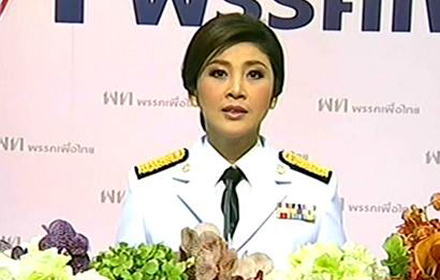Cabinet reshuffle offers nothing new for the far South?
The cabinet on November 2 resolved to let Prime Minister Yingluck Shinawatra to take charge of overseeing the unrest situation in the deep South after General Yutthasak Sasiprapa lost his cabinet post in the latest cabinet reshuffle.

What does that mean exactly? It means that none of the six deputy prime ministers namely Chalerm Yubamrung, Kittirat Naranong, Chumphol Silpa-archa and three newcomers Surapong Tovichakchaikul, Pongthep Thepkanchana and Plodprasop Suraswadi are put in charge of overseeing the situation in the three southernmost provinces.
The prime minister however explained that under the framework of the Strategic and Policy Committee to Resolve Southern Border Problems which is the main organization overseeing the situation in the deep South Pongthep was assigned to oversee legal affairs while Chalerm and the Southern Border Provinces Administration Centre were placed in charge of development matters. The prime minister herself and Army Commander-in-Chief General Prayuth Chan-ocha are in charge of security affairs.
On top of that former deputy prime minister Yutthasak was appointed the prime minister’s advisor overseeing the Strategic and Policy Committee. That raises the question about why removing General Yutthasak from the cabinet?
Is it a good sign that the prime minister is in charge of security affairs in the restive deep South? The answer is that it may not be because the prime minister is already heavily loaded so she may not have the time to focus on the problems down there. Take for an example, the prime minister will be in Thailand for less than ten days throughout November.
In realty, the military headed by General Prayuth is in charge of security affairs and the SBPAC led by Lt-Gen Paradon Patthanabutr is in charge of development affairs and in coordinating with 17 ministries and 66 units which have been working in the region largely in the fields of social and economic development through the Strategic and Policy Committee which is placed under the responsibility of General Yutthasak.
Besides the shuffling of people in charge of various affairs in the far South, there appears to be no new policy initiatives or political initiatives from the government despite the fact that there are 5-6 issues awaiting clear policy guidelines from the government.
The pending issues are as follows: the use of Article 21 of the Internal Security Act to encourage suspected insurgents to surrender by dropping criminal charges against them in exchange for a six-month re-education programme; peace talks with insurgent groups; a special administrative zone for the deep South such as Nakhon Pattani which was floated by the Pheu Thai party during its election campaign; the emergency decree whether it should be lifted or not, mega development projects for the region and temporary release for suspected insurgents in order to ease congestion problem in prisons.
There seems to be a misunderstanding about the insurgency problem in the deep South when some government officials said that Thailand can afford to wait for peace to be restored in the region because the insurgency war has been going on for just nine years compared to 40 years in the Philippines before a framework peace agreement was reached recently.
The fact is that the restive problem has been with us for more than 100 years or over 60 years if it is counted from the time of the murder of Haji Sulong, a wellknown Muslim leader, allegedly by Thai police. And the fire is still burning with people getting killed almost every day.
